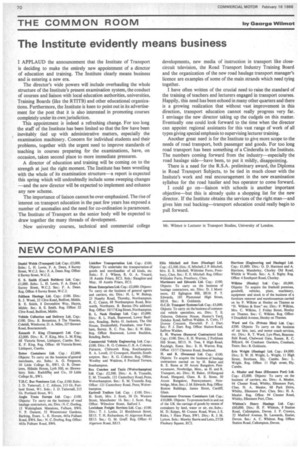The Institute evidently means business
Page 72

If you've noticed an error in this article please click here to report it so we can fix it.
I APPLAUD the announcement that the Institute of Transport is deciding to make the entirely new appointment of a director of education and training. The Institute clearly means business and is entering a new era.
The director's wide powers will include overhauling the whole structure of the Institute's present examination system, the conduct of courses and liaison with local education authorities, universities, Training Boards (like the RTITB) and other educational organizations. Furthermore, the Institute is keen to point out in its advertisement for the post that it is also interested in promoting courses completely under its own jurisdiction.
This appointment is indeed a refreshing change. For too long the staff of the Institute has been limited so that the few have been inevitably tied up with administrative matters, especially the examination machinery. Concern for individual students and their problems, together with the urgent need to improve standards of teaching in courses preparing for the examinations, have, on occasion, taken second place to more immediate pressures.
A director of education and training will be coming on to the strength at just the right moment. The Institute has been wrestling with the whole of its examination structure—a report is expected this spring which will undoubtedly include some sweeping changes —and the new director will be expected to implement and enhance any new scheme.
The importance of liaison cannot be over-emphasized. The rise of interest on transport education in the past few years has exposed a number of anomalies and the need for co-ordination is paramount. The Institute of Transport as the senior body will be expected to draw together the many threads of development.
New university courses, technical and commercial college developments, new media of instruction in transport like closecircuit television, the Road Transport Industry Training Board and the organization of the new road haulage transport manager's licence are examples of some of the main strands which need tying together.
I have often written of the crucial need to raise the standard of the training of teachers and lecturers engaged in transport courses. Happily, this need has been echoed in many other quarters and there is a growing realization that without vast improvement in this direction, transport education cannot really progress very far. I envisage the new director taking up the cudgels on this matter. Eventually one could look forward to the time when the director can appoint regional assistants for this vast range of work of all types giving special emphasis to supervising lecturer training.
Another great need is for the Institute to give more scope to the needs of road transport, both passenger and goods. For too long road transport has been something of a Cinderella in the Institute. The numbers coming forward from the industry—especially the road haulage side—have been, to put it mildly, disappointing.
There is a need for the R.S.A. preliminary award, the Diploma in Road Transport Subjects, to be tied in much closer with the Insitute's work and real encouragement in the new examination syllabus for the road haulier and bus operator to come forward.
I could go on—liaison with schools is another important objective—but this is already quite a shopping list for the new director. If the Institute obtains the services of the right man—and gives him real backing—transport education could really begin to pull forward.




















































































































